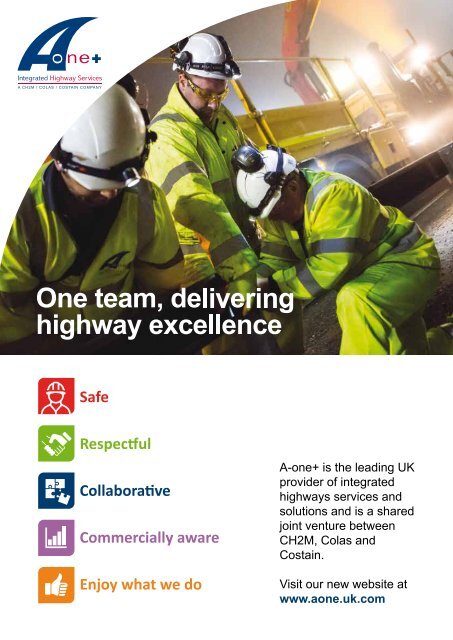SHOW GUIDE
2fnrE7n
2fnrE7n
Create successful ePaper yourself
Turn your PDF publications into a flip-book with our unique Google optimized e-Paper software.
TALKING HEADS<br />
www.highways-uk.com<br />
#hwysuk<br />
27<br />
Meeting the skills need<br />
Attracting talent through a variety of different routes will be key to<br />
deliver the quantum of skilled professionals needed to deliver on<br />
the ground, says Dave Beddell, AECOM’s market sector leader for<br />
Strategic highways<br />
Over the past few years<br />
transport infrastructure has<br />
been at the heart of the UK’s<br />
gradual economic recovery. With an<br />
ambitious pipeline of projects lying<br />
in wait, the magnitude of which have<br />
not been seen for a generation, a key<br />
issue for the roads sector will be its<br />
ability to deliver the quantum of skilled<br />
professionals needed to deliver on the<br />
ground.<br />
A range of major schemes including<br />
the Lower Thames Crossing, A303<br />
Stonehenge, Silvertown Crossing<br />
and the A9 corridor form an exciting<br />
pipeline of vital projects that are<br />
likely to apply pressure across the<br />
sector for years to come. The National<br />
Infrastructure Plan for Skills, which was<br />
introduced last year, goes some way<br />
towards mapping expertise against<br />
this pipeline of projects and serves<br />
“By developing a more<br />
inclusive culture industry<br />
can increase its capacity<br />
and performance by<br />
creating opportunities that<br />
allow the workforce to<br />
reach its full potential, which<br />
in turn will enable it to better<br />
understand and respond to<br />
client’s needs”<br />
to inform recruitment strategies in<br />
boardrooms across the UK. However<br />
many of these projects are likely to<br />
draw on similar areas of the supply<br />
chain in parallel, meaning an integrated<br />
approach to planning is needed that<br />
will require government and industry<br />
to work closer together in order to<br />
develop the necessary skills.<br />
Attracting talent through a variety of<br />
different routes will be key to building<br />
this enhanced capacity. The Modern<br />
Apprentices that industry invests in<br />
now will be ready to play a meaningful<br />
role on projects in two or three years’<br />
time – precisely when they will be<br />
needed most. Recognising this, AECOM<br />
has increased its apprenticeship<br />
recruitment and will be hiring more<br />
apprentices than ever this coming<br />
year. Our Apprenticeship Development<br />
Programme will include training for<br />
specialist skills that we know will be<br />
needed to deliver future projects,<br />
whilst we are working closely with the<br />
Technician Apprenticeship Consortium<br />
(TAC) to develop new apprenticeship<br />
programmes for high demand<br />
transportation disciplines such as<br />
transport planning and rail.<br />
There is a danger of course that<br />
industry will merely compete for this<br />
existing talent, so we need to think<br />
differently and more broadly if we are<br />
to meet the challenges we face. To<br />
achieve success, we need to learn and<br />
adapt quickly. Clients look to global<br />
companies like AECOM to have a<br />
diverse workforce and recognise that<br />
innovation in delivery is enhanced by<br />
our ability to draw from a wealth of<br />
different backgrounds and experiences.<br />
By developing a more inclusive culture<br />
industry can increase its capacity and<br />
performance by creating opportunities<br />
that allow the workforce to reach its<br />
full potential, which in turn will enable<br />
it to better understand and respond<br />
to client’s needs. For example, the<br />
“Attracting talent through a<br />
variety of different routes<br />
will be key to building this<br />
enhanced capacity”<br />
qualities that servicemen and women<br />
possess are hugely relevant to firms<br />
working in the built environment. The<br />
armed forces are divided into many<br />
specialist units that must co-operate to<br />
complete highly complex tasks. They<br />
are often experienced at motivating<br />
others, co-ordinating teams and getting<br />
the best out of individuals – all essential<br />
traits that are directly applicable to the<br />
provision of integrated, multidisciplinary<br />
services such as those offered by<br />
AECOM.<br />
Increasing capacity is only one<br />
aspect of the challenge of course.<br />
Equipping an expanding workforce<br />
to meet the technical and leadership<br />
needs of any future pipeline will require<br />
agility and innovation. At AECOM, the<br />
development of our online University<br />
has provided our workforce with access<br />
to over 5,000 courses in 10 different<br />
languages. Accessible via a cloud, this<br />
virtual campus enables employees<br />
to develop their competencies and<br />
expertise in facilitated classrooms and<br />
at their own convenience.<br />
Companies that are able to think<br />
differently, work collaboratively and see<br />
beyond their own immediate resourcing<br />
needs, stand to gain a lot.<br />
C<br />
M<br />
Y<br />
CM<br />
MY<br />
CY<br />
CMY<br />
K



